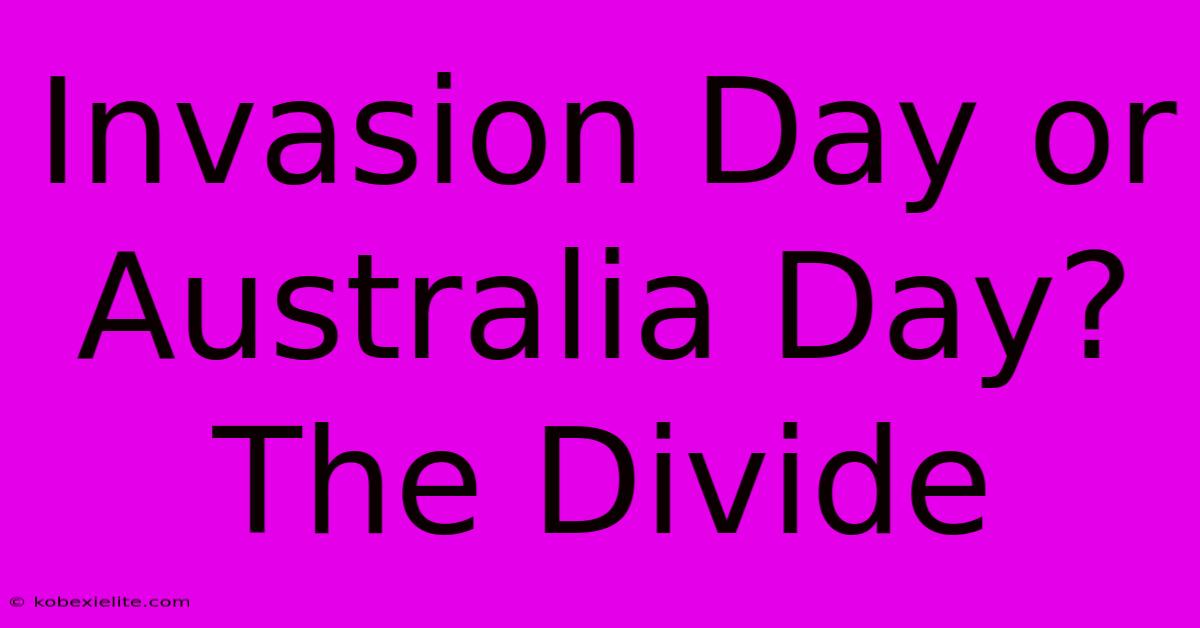Invasion Day Or Australia Day? The Divide

Discover more detailed and exciting information on our website. Click the link below to start your adventure: Visit Best Website mr.cleine.com. Don't miss out!
Table of Contents
Invasion Day or Australia Day? The Divide
Australia Day, celebrated annually on January 26th, is a day of national significance, but also a day deeply divided. For many, it's a time for celebration, community, and reflection on Australian history and identity. For others, it's a day of mourning, protest, and a stark reminder of the invasion and its devastating consequences for Indigenous Australians. This fundamental difference in perspective creates a significant national divide.
Two Sides of the Same Coin: Understanding the Perspectives
The core of the debate lies in the historical event commemorated. January 26th, 1788, marks the arrival of the First Fleet in Sydney Cove, an event widely considered the beginning of British colonization. For many Australians, this signifies the birth of a nation, a symbol of progress, resilience, and the forging of a unique national identity. Celebrations often involve community barbecues, fireworks, and patriotic displays.
However, for Aboriginal and Torres Strait Islander peoples, January 26th is a day of mourning, marking the commencement of dispossession, violence, disease, and the systematic dismantling of their cultures and societies. It's a date that represents the beginning of centuries of suffering, loss of land, and ongoing systemic injustices. For them, it's not a day of celebration, but rather a day to acknowledge the ongoing impact of colonization and demand reconciliation.
The Language of the Debate: "Invasion Day" vs. "Australia Day"
The very terminology used highlights the divide. While "Australia Day" represents a national celebration, the term "Invasion Day" reflects a different historical interpretation. This shift in language highlights a deliberate attempt to reframe the narrative, centering the experience of Indigenous Australians. The choice of terminology often signifies a person’s stance on the issue. The use of "Invasion Day" aims to acknowledge the traumatic experience of dispossession and colonization.
The Path Towards Reconciliation: Bridging the Divide
The ongoing debate surrounding January 26th highlights the need for a deeper national conversation about reconciliation. Addressing the historical injustices faced by Indigenous Australians is crucial. This requires:
- Truth-telling: A frank and honest acknowledgment of the past, including the devastating impact of colonization on Indigenous communities.
- Education: Implementing comprehensive education programs that accurately depict Australian history, including the perspectives and experiences of Aboriginal and Torres Strait Islander peoples.
- Reconciliation: Actively working towards reconciliation through practical measures like addressing land rights, closing the gap in health and education outcomes, and fostering mutual respect and understanding.
- Open Dialogue: Encouraging open and respectful dialogue between different groups, acknowledging diverse perspectives and promoting empathy.
Finding Common Ground: Moving Beyond the Division
While the division surrounding January 26th is significant, it's not insurmountable. Many are actively seeking ways to acknowledge both the positive aspects of Australian history and the ongoing struggle for reconciliation. Some propose shifting the date of the national holiday to one that is less contentious for all Australians. Others suggest focusing on inclusive celebrations that honor Indigenous cultures and histories. Ultimately, the path towards a truly unified Australia requires meaningful engagement with the complex historical narrative and a commitment to building a more equitable and just society.
Keywords: Australia Day, Invasion Day, January 26th, Indigenous Australians, Aboriginal, Torres Strait Islander, reconciliation, colonization, history, national holiday, debate, controversy, truth-telling, education, cultural awareness, national identity, celebration, mourning, protest, dispossession.
Meta Description: The debate surrounding Australia Day (Invasion Day) reveals a deep national divide. This article explores the different perspectives, the historical context, and the path towards reconciliation.
Note: This article aims to present a balanced view of a complex issue. It is important to engage with diverse perspectives and continue the ongoing dialogue surrounding reconciliation in Australia.

Thank you for visiting our website wich cover about Invasion Day Or Australia Day? The Divide. We hope the information provided has been useful to you. Feel free to contact us if you have any questions or need further assistance. See you next time and dont miss to bookmark.
Featured Posts
-
Englands Ashes Misery Continues
Jan 26, 2025
-
Bkfc Knucklemania 5 Full Fight Results
Jan 26, 2025
-
Dylan Songs On Snl Chalamet
Jan 26, 2025
-
Epl City Back In Top Four Race
Jan 26, 2025
-
Keys Australian Open Victory Over Sabalenka
Jan 26, 2025
